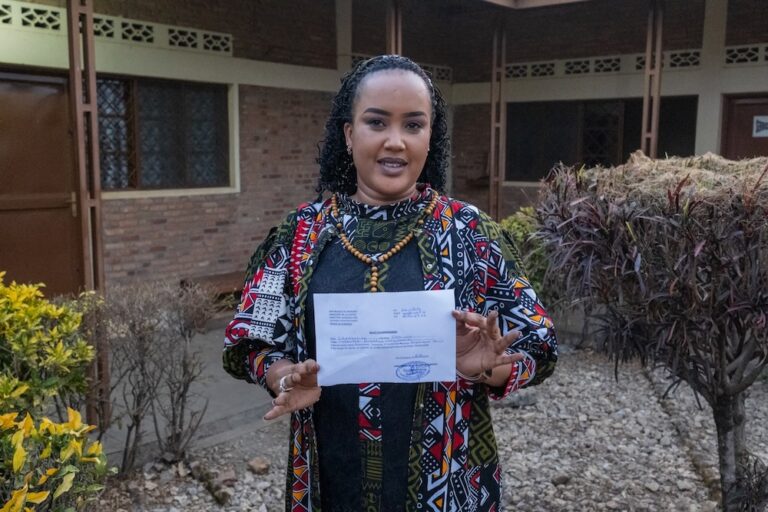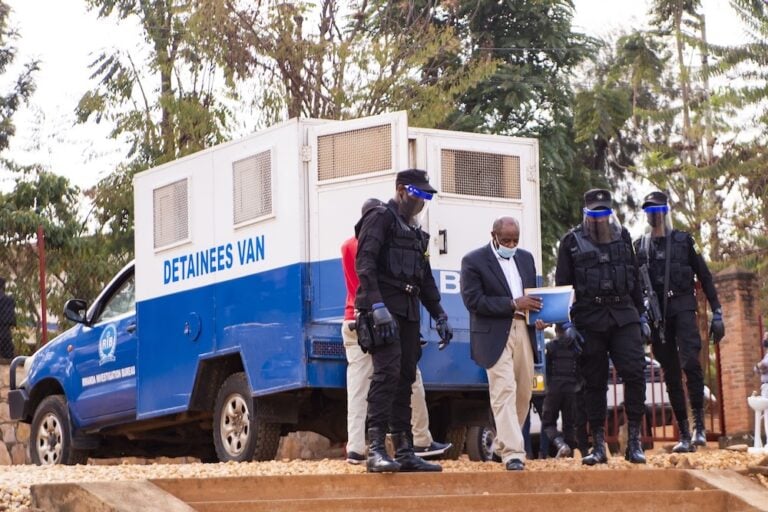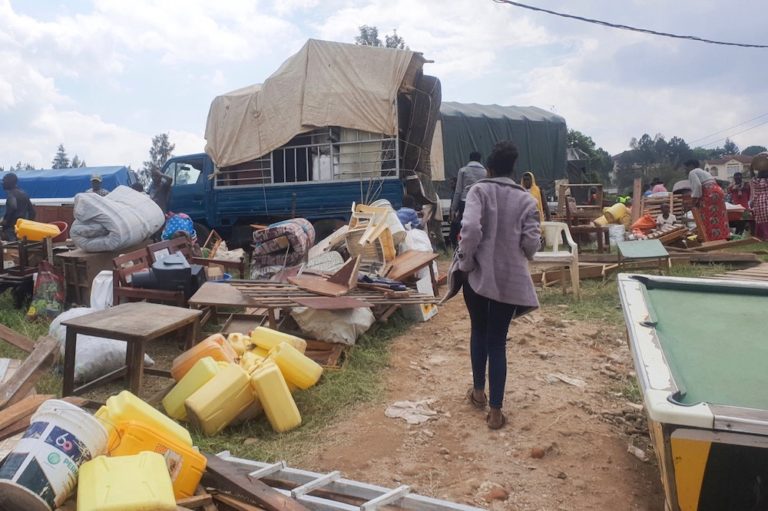(RSF/IFEX) – The following is a 14 September 2000 RSF press release: Paris, 14 September 2000 Rwanda Opening of media trial at the ICTR Reporters sans frontières calls for the conviction of those responsible for Rwandan “hate media” Many times announced and postponed, the opening of the trial of those principally responsible for Rwanda’s “hate […]
(RSF/IFEX) – The following is a 14 September 2000 RSF press release:
Paris, 14 September 2000
Rwanda
Opening of media trial at the ICTR
Reporters sans frontières calls for the conviction of those responsible for Rwandan “hate media”
Many times announced and postponed, the opening of the trial of those principally responsible for Rwanda’s “hate media” is scheduled for 18 September 2000 in Arusha, Tanzania. The International Criminal Tribunal for Rwanda (ICTR) will try Jean-Bosco Barayagwiza, Ferdinand Nahimana and Hassan Ngeze, accused by their respective media of having called for the murder of thousands of people in 1994 in Rwanda. Some 100 witnesses have been called to appear.
Reporters sans frontières (RSF) calls on the ICTR to punish the three accused with heavy prison sentences. The ICTR’s sentence would thus constitute a precedent that would dissuade other similar initiatives in Rwanda or in other countries. The organisation also hopes that the trial will shed light on the mechanisms that allowed the creation and development of a particularly odious and dangerous extremist press.
RSF notes that in 1994, both before and during the genocide, these “hate media”, notably Radio-télévision libre des mille collines (RTLM) and the bimonthly Kangura, spread the names and addresses of future victims of the militias, sometimes directly calling for the elimination of the “enemies”. One example among others are the words of Hassan Ngeze in Kangura in January 1994: “What we do not say to the inyenzi [cockroaches – name given by the “hate media” to Tutsis] is that if they lift up their heads again, it will no longer be necessary to go fight the enemy in the bush. We will instead start by eliminating the internal enemy. . . . They will disappear.” As for RTLM, nicknamed “Radio-Télé-la-Mort” (Radio-TV Death), in April 1994 it invited the population to hunt down “the foreigners” of the Rwandan Patriotic Front (RPF, currently in power). The radio station also asked the military to “intensify the elimination of the inkotanyi [RPF soldiers] and their accomplices, so as not to allow people to survive who could then accuse them”.
Since their creation, these two media acted against the International Convenant on Civil and Political Rights, which forbids “any call for national, racial or religious hatred” and “all propaganda calling for war”. Jean-Bosco Barayagwiza, Ferdinand Nahimana and Hassan Ngeze saw themselves as fighters on the side of the militias rather than journalists who do information work.
At the beginning of the genocide in April 1994, RSF called in vain on the United Nations, which was present on the ground within the framework of MINUAR, to intervene in order to stop the RTLM programmes. A few months later, RSF intervened to prevent the reappearance of extremist newspapers in refugee camps. Since then, RSF has not ceased denouncing the journalists who were most involved in the genocide, collecting testimonies and documents. The organisation has cooperated with ICTR investigators, with whom it has met regularly since this date.
The three accused in the “hate media” trial are:
– Jean-Bosco Barayagwiza, former director of political affairs at the Ministry of Foreign Affairs and former member of RTLM’s initiative committee. The radio station’s programmes incited people to murder Tutsis and certain Hutus. Jean-Bosco Barayagwiza was allegedly summoned to a meeting at the Ministry of Information, in November 1993, where he was allegedly ordered to stop broadcasting messages promoting hatred and inter-ethnic division. A second meeting on the same issue was allegedly held on 10 February 1994. However, RTLM allegedly continued to broadcast programmes calling for hatred until about the end of July.
– Ferdinand Nahimana, former director of the Rwandan Information Office and former director of RTLM. He is charged with being one of the ideologues of the genocide and with having gathered around him an editorial team that incited people, on RTLM’s airwaves, to assassinate Tutsis and opposition Hutus. Ferdinand Nahimana allegedly planned, directed and defended the radio station’s programmes. According to the ICTR prosecutor, he had “knowledge of the programmes and of the programmes’ impact on the population.”
– Hassan Ngeze, former editor-in-chief of the extremist bimonthly Kangura. He was one of the most radical propagandists for Hutu extremism before, during and after the genocide. During the unfolding of events, Hassan Ngeze was the editor-in-chief and therefore responsible for the periodical’s editorial position. According to the ICTR, certain articles and editorials published in Kangura magazine allegedly “contributed to the preparation of the genocide against the Tutsis, incited people to murder or attack the integrity of Tutsis, and persecuted Tutsis and certain Hutus”. Hassan Ngeze also allegedly produced programmes for Radio Rwanda and RTLM.
The three men are accused of “direct and public incitement to commit genocide” and “crimes against humanity”. They decided to plead “not guilty” during the trial.
Another journalist was originally summoned to appear at the same time as the other three. Georges Ruggiu, a Belgian of Italian origin, who took part in RTLM’s activities and who notably called for the murder of Belgian soldiers on the air, finally accepted responsibility for the charges brought against him. Having confessed and been sentenced to twelve years in prison in June 2000, he delivered a key testimony to the ICTR that will be used against the three other accused.


